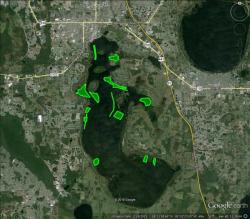
The Florida Fish and Wildlife Conservation Commission (FWC) has begun treating hydrilla in portions of Lake Toho, also known as Lake Tohopekaliga, and will continue treatment until Feb. 26, weather permitting.
The FWC's Invasive Plant Management Section will treat a total of 1,030 acres of hydrilla on this Osceola County lake. The treatment will help boaters navigate the lake, aid in flood protection and prevent encroachment by hydrilla on native plants.
Applications of Aquathol, Oasis, and Diquat herbicides will be used in the treatment, and there are no restrictions for fishing or swimming in treated areas. Aquathol, Oasis, and Diquat are approved for use in lakes by the U.S. Environmental Protection Agency and Florida Department of Agriculture and Consumer Services.
Hydrilla is an invasive aquatic plant spread easily by boats throughout the state's lakes and rivers. This nonnative plant clogs waterways, makes recreational activities difficult or impossible and chokes out beneficial aquatic plants. Managing and treating it is necessary for the health of Florida's waters and to enable continued recreational boating and other aquatic activities.
For questions about this treatment, contact Ed Harris, FWC invasive plant management biologist, at 407-858-6170.
The FWC's Invasive Plant Management Section will treat a total of 1,030 acres of hydrilla on this Osceola County lake. The treatment will help boaters navigate the lake, aid in flood protection and prevent encroachment by hydrilla on native plants.
Applications of Aquathol, Oasis, and Diquat herbicides will be used in the treatment, and there are no restrictions for fishing or swimming in treated areas. Aquathol, Oasis, and Diquat are approved for use in lakes by the U.S. Environmental Protection Agency and Florida Department of Agriculture and Consumer Services.
Hydrilla is an invasive aquatic plant spread easily by boats throughout the state's lakes and rivers. This nonnative plant clogs waterways, makes recreational activities difficult or impossible and chokes out beneficial aquatic plants. Managing and treating it is necessary for the health of Florida's waters and to enable continued recreational boating and other aquatic activities.
For questions about this treatment, contact Ed Harris, FWC invasive plant management biologist, at 407-858-6170.


 Advertising
Advertising